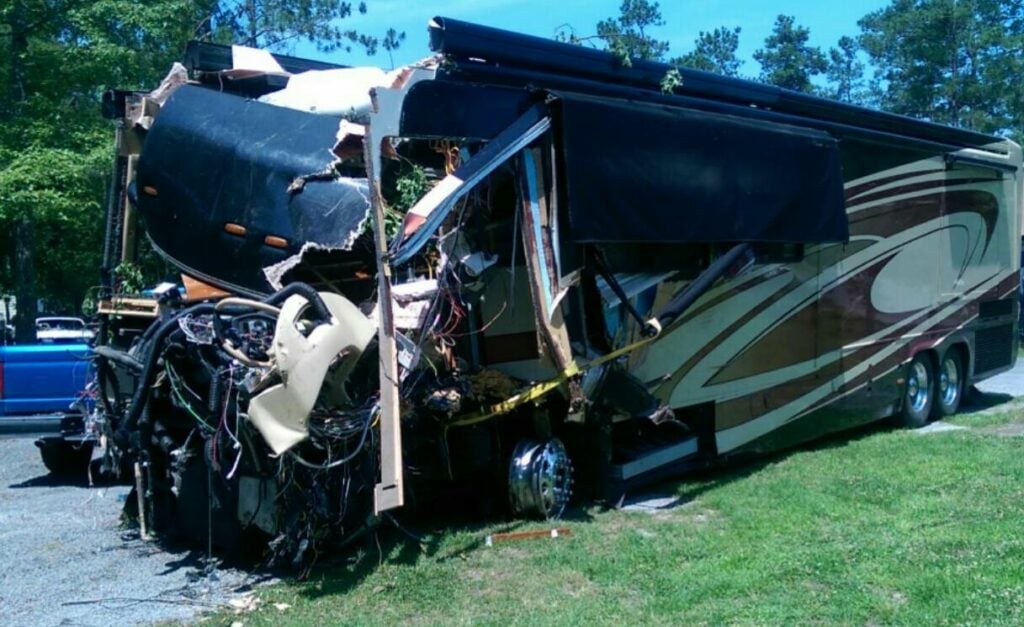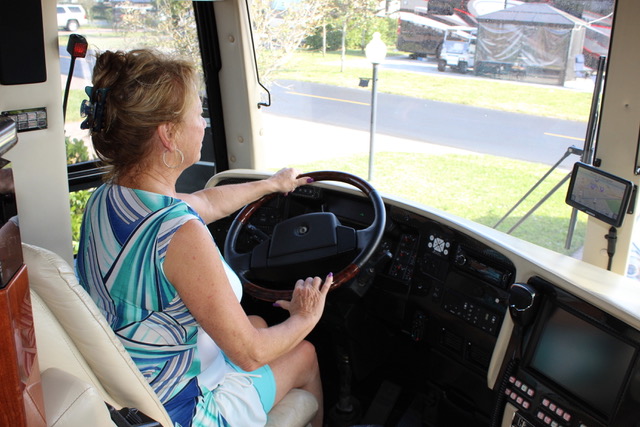Anyone with the cash can buy a recreational vehicle. Most can be driven on the street without any additional training. But if the owner hasn’t mastered the art of avoiding RV wrecks and disasters, all bets are off. Two RV driver education experts in the field explain why the price of a weekend RV driving school will cost you far less money and heartache than repairing a wrecked rig.
RV Driving without a G.O.A.L

Lots of us think we are good RV drivers, but even the most experienced RVer can stand to learn new techniques to lower their accident risk. My husband and I learned this lesson three years after we became full-time RVers.
We drove into the Utah Forest Service campground and found that perfect every RVer dreams about. It was so peaceful and scenic that we weren’t ready to leave on check-out day, so we extended our stay. But our holding tanks needed emptying and our water supply replenished, so we packed up and went to town. A couple hours later we returned to the same spot.

As always, I got out of the truck to guide my husband into the back-in site. But our rig was at an odd angle, which made the parking job a tedious chore. The large boulder on our truck’s right rear passenger side didn’t make things easier as he maneuvered back and forth to squeeze past the obstruction.
When I saw that he was getting too close and yelled to warn him, the throaty roar of our Dodge was louder than my screech. And before I could flail my arms to say “STOP!” the sickening crunch of metal on granite filled the air.
The Art of Avoiding RV Wrecks and Disasters
Was the accident preventable? Absolutely, according to Gary Lewis, founder of RV Basic Training. Lewis says we failed to follow a common sense parking strategy followed by commercial truckers everywhere. It’s known as the “G.O.A.L” –
Get Out And Look!
We neglected to walk around that spot to gauge the distance of the rock to our truck. Had we done so, our truck would still look brand new.
“How much simpler can you get?” says Lewis. “If every RV driver drove like a commercial driver you won’t get there with a problem.”

Ten years ago Lewis launched his school to help RVers avoid RV wrecks and disasters like ours. Since then, the enthusiastic instructor says he’s seen every kind of RV wreck under the sun. Usually people call him after an accident has happened, eager to get their confidence back and continue RVing.
Lewis and his cadre of 12 instructors (and growing) teach drivers all the basics of good RV driving skills, including:
Straight line backingOffset backingParallel parkingBackside backing
Through his hands-on training and RV Basic Training manual, Lewis gets students into the habit of thinking like commercial truckers whenever they’re behind the wheel. “You never move it without doing a safety check,” he says. “Do a walk around. Check underneath, look at the tires. Go clockwise and then counter clockwise to make sure you’re all clear. Are the doors secured? Any funny smells? Is everything put away? All commercial drivers do this.”
Objects are Always Closer Than They Appear
Most RV wrecks happen like ours did – a driver hits an object that is closer than it appears. George Mayleben, owner of RV Driving School, says other common RV wrecks often seen on the road include:
hitting filling station islandscolliding with low bridgesmiscalculating stopping distances
The list grows longer with other accident factors, like over-inflated tires and overloaded RV cargo, he says.

“The RVs are big!” explains Mayleben. “They require an understanding of how to keep the vehicle under control.”
Despite the large ticket price to buy RVs, most RVers take the “It won’t happen to me” approach when getting behind the wheel. Young RVers and elder retired seniors alike typically don’t think RV wrecks and disasters are other people’s problem. They usually don’t seek RV driver education training until something bad happens.
“We see a variety of reasons why folks come to us for help. Sometimes it is the realization that the RV is more of a challenge than originally anticipated.” Mayleben says. His students are mostly comprised of drivers over 55. And although younger people are buying RVs each year, most don’t feel they need the training.
Women are a fast growing demographic in RV driving schools like Maylben’s. More are learning how to drive RVs, and instructors agree that the investment is especially valuable for them. If a woman is traveling with a partner who does the majority of the driving, knowing how to drive their RV can make life much easier if an unexpected health problem happens to the main driver. “We train an awful lot of women who have been put in that position because of a health issue with the husband,” says Lewis.
Give RVs the Respect they Deserve.
In any good RV driving school, students have the choice to learn RV driving tips in a classroom setting as well as one-on-one lessons with professionally trained instructors. The road lessons can be provided in a RV owned by the student, or in some instances, rentals are provided by the school itself. New driver lessons are offered as well as refresher courses for more experienced RVers. Some training sessions are just one day while others are multi-day. With so many education options, avoiding RV wrecks and disasters is totally possible.
“You cannot drive a bus the same way you drive a car,” warns Lewis. “If you don’t give it the respect it deserves and making sure you’re all clear, you’re going to have a problem. It’s that simple.”
This information is for educational purposes. VIARV shall not be responsible nor retain liability for RVer’s use of the provided information. Prior to making any RV service decision, you are advised to consult with an RV professional.


Comments